 Tìm kiếm
Tìm kiếm
Phần thứ tư Bộ luật tố tụng dân sự 2015: Giải quyết vụ án dân sự theo thủ tục rút gọn
| Số hiệu: | 92/2015/QH13 | Loại văn bản: | Luật |
| Nơi ban hành: | Quốc hội | Người ký: | Nguyễn Sinh Hùng |
| Ngày ban hành: | 25/11/2015 | Ngày hiệu lực: | 01/07/2016 |
| Ngày công báo: | 29/12/2015 | Số công báo: | Từ số 1251 đến số 1252 |
| Lĩnh vực: | Thủ tục Tố tụng | Tình trạng: | Còn hiệu lực |
TÓM TẮT VĂN BẢN
Bộ luật tố tụng dân sự 2015 được ban hành ngày 25/11/2015 với nhiều quy định về thẩm quyền của Tòa án; cơ quan tiến hành tố tụng, người tiến hành tố tụng; thành phần giải quyết việc dân sự; người tham gia tố tụng; chứng minh, chứng cứ; biện pháp khẩn cấp tạm thời; chi phí tố tụng;…
Bộ luật tố tụng dân sự năm 2015 gồm 10 Phần, 42 Chương, 517 Điều (Thay vì Bộ luật Tố tụng dân sự 2004 chỉ gồm 9 Phần, 36 Chương, 418 Điều). BLTTDS 2015 có bố cục gồm các Phần sau:
- Những quy định chung
- Thủ tục giải quyết vụ án tại Tòa án cấp sơ thẩm
- Thủ tục giải quyết vụ án tại Tòa án cấp phúc thẩm
- Giải quyết vụ án dân sự theo thủ tục rút gọn
- Thủ tục xét lại bản án, quyết định đã có hiệu lực pháp luật
- Thủ tục giải quyết việc dân sự
- Thủ tục công nhận và co thi hành tại Việc Nam hoặc không công nhận bản án, quyết định dân sự của Tòa án nước ngoài; công nhận và cho thi hành phán quyết của trọng tài nước ngoài
- thủ tục giải quyết vụ việc dân sự có yếu tố nước ngoài
- Thi hành Bản án, quyết định dân sự của Tòa án
- Xử lý hành vi cản trở hoạt động tố tụng, khiếu nại, tố cáo trong tố tụng
Theo đó, Bộ luật TTDS 2015 có những điểm sau đáng chú ý:
- Bổ sung mới quy định về Giải quyết vụ việc dân sự trong trường hợp chưa có điều luật để áp dụng:
+ Thẩm quyền của Tòa án thụ lý, giải quyết vụ việc dân sự trong trường hợp chưa có điều luật để áp dụng được thực hiện theo các điều từ Điều 35 đến Điều 41 của Bộ luật tố tụng dân sự năm 2015.
+ Trình tự, thủ tục thụ lý, giải quyết vụ việc dân sự theo Bộ luật số 92/2015/QH13.
+ Nguyên tắc giải quyết vụ việc dân sự trong trường hợp chưa có điều luật để áp dụng thực hiện theo Điều 45 Luật này về việc áp dụng tập quán, áp dụng tương tự pháp luật, áp dụng các nguyên tắc cơ bản của pháp luật dân sự, án lệ, lẽ công bằng.
- Phiên họp kiểm tra việc giao nộp, tiếp cận, công khai chứng cứ và hòa giải
Thẩm phán tiến hành mở phiên họp kiểm tra việc giao nộp, tiếp cận, công khai chứng cứ và hòa giải giữa các đương sự. Trước khi tiến hành phiên họp, Thẩm phán phải thông báo cho đương sự, người đại diện hợp pháp của đương sự, người bảo vệ quyền và lợi ích hợp pháp của đương sự về thời gian, địa điểm tiến hành phiên họp và nội dung của phiên họp.
- Phát hiện và kiến nghị sửa đổi, bổ sung hoặc hủy bỏ văn bản quy phạm pháp luật tại Điều 221 Bộ luật tố tụng dân sự 2015
Trong quá trình giải quyết vụ án dân sự, nếu phát hiện văn bản quy phạm pháp luật liên quan đến việc giải quyết vụ án dân sự có dấu hiệu trái với Hiến pháp, luật, nghị quyết của Quốc hội, pháp lệnh, nghị quyết của Ủy ban thường vụ Quốc hội, văn bản quy phạm pháp luật của cơ quan nhà nước cấp trên thì Tòa án thực hiện như sau:
+ Trường hợp chưa có quyết định đưa vụ án ra xét xử thì Thẩm phán được phân công giải quyết vụ án báo cáo và đề nghị Chánh án Tòa án đang giải quyết vụ án có văn bản đề nghị Chánh án Tòa án nhân dân tối cao kiến nghị cơ quan nhà nước có thẩm quyền xem xét sửa đổi, bổ sung hoặc bãi bỏ văn bản quy phạm pháp luật;
+ Trường hợp đã có quyết định đưa vụ án ra xét xử hoặc vụ án đang được xem xét tại phiên tòa hoặc đang được xét xử theo thủ tục giám đốc thẩm, tái thẩm thì Hội đồng xét xử tạm ngừng phiên tòa theo quy định tại điểm e khoản 1 Điều 259 của Bộ luật này và báo cáo Chánh án Tòa án đang giải quyết vụ án có văn bản đề nghị Chánh án Tòa án nhân dân tối cao kiến nghị cơ quan nhà nước có thẩm quyền xem xét sửa đổi, bổ sung hoặc bãi bỏ văn bản quy phạm pháp luật.
- Điều 247 Bộ Luật 92/2015/QH13 quy định rõ nội dung và phương thức tranh tụng tại phiên tòa
+ Tranh tụng tại phiên tòa bao gồm việc trình bày chứng cứ, hỏi, đối đáp, trả lời và phát biểu quan điểm, lập luận về đánh giá chứng cứ, tình tiết của vụ án dân sự, quan hệ pháp luật tranh chấp và pháp luật áp dụng để giải quyết yêu cầu của các đương sự trong vụ án.
- Bổ sung phần thứ tư về Giải quyết vụ án dân sự theo thủ tục rút gọn quy định:
+ Điều kiện áp dụng thủ tục rút gọn
+ Quyết định đưa vụ án ra xét xử theo thủ tục rút gọn
+ Phiên tòa xét xử theo thủ tục rút gọn
+ Thủ tục phúc thẩm rút gọn đối với bản án, quyết định của Tòa án cấp sơ thẩm bị kháng cáo, kháng nghị
Bộ luật tố tụng DS năm 2015 có hiệu lực từ ngày 01/07/2016 trừ một số quy định thì có hiệu lực từ ngày 01/01/2017, cụ thể tại Khoản 1 Điều 517 Bộ luật TTDS năm 2015.
Văn bản tiếng việt
Văn bản tiếng anh
RESOLUTION OF CIVIL LAWSUITS ACCORDING TO SIMPLIFIED PROCEDURES
RESOLUTION OF CIVIL LAWSUITS ACCORDING TO SIMPLIFIED PROCEDURES AT FIRST-INSTANCE TRIALS
Article 316. Scope of application of simplified procedures
1. Simplified procedures are procedures that are applied to resolve civil lawsuits which fully satisfy conditions specified in this Code in simpler procedures than common civil lawsuit resolution procedures to resolve the cases quickly but still ensure the compliance with law.
2. Provisions of the Part shall be applied to resolve cases according to simplified procedures; cases other than those specified in this Part shall be resolved according to other provisions of this Code.
3. If there are other law provisions stating that a civil dispute shall be resolved according to simplified procedure, the resolution of such dispute shall be conducted according to procedures specified in this Part.
Article 317. Conditions for application of simplified procedures
1. The Court shall resolve a case according to simplified procedure when all of the following conditions are satisfied:
a) The case has simple details, clear legal relationship and the involved parties have admitted their obligations; materials and evidences are sufficient, ensuring the sufficiency of grounds for the resolution of the case and the Court does not have to collect materials/evidences;
b) Addresses of residence and headquarters of all of involved parties are determined;
c) None of involved parties reside overseas and there are no properties being in dispute are in foreign countries, unless the involved parties residing overseas and the ones residing in Vietnam have reached agreements to request the Courts to resolve the cases according to simplified procedures or the involved parties have presented evidences about the legitimate right to ownership towards the properties and have reached agreements about the handling of the properties.
2. Regarding labor cases that have been accepted and settled according to simplified procedures, if the employers having foreign nationalities or their lawful representatives have left their residence/headquarter addresses that have been priorly declared without notification to other involved parties and the Courts, such entities shall be considered to conceal their addressees on purpose. The Courts shall continue resolving the cases according to simplified procedure specified in this Part.
3. During the preparation for the resolution of the cases according to simplified procedures, if any of the following details is detected and, as the result, the cases no longer eligible for resolution according to simplified procedures, the Courts shall make decisions to resolve the cases according to common procedures:
a) New details are found out but the involved parties cannot reach agreements and therefore such details need verification, more materials and evidences need to be collected and expertises need to be conducted;
b) Involved parties cannot reach agreements about the prices of the properties being in dispute and such properties shall be subject to price assessment/appraisal;
c) Cases where provisional emergency measures must be applied;
d) New persons with relevant interests and duties are found out;
dd) New counter-claims or independent claims are found out;
e) New involved parties who reside overseas, properties in dispute that are in foreign countries, requirements for verification or collection of evidences from foreign countries subject to request for judicial assistance, except for cases specified in point c clause 1 of this Article.
4. If the cases are transferred for resolution according to common procedures, the duration for preparation for the resolution of the cases shall be re-counted from the day on which the decisions to transfer the cases for resolution according to common procedures are issued.
Article 318. Decisions to bring cases to trial for resolution according to simplified procedures
1. Within 01 month from the day on which the cases are accepted according to regulations in clauses 3 and 4 Article 195 of this Code, the Judge who are assigned to resolve the case must make decisions to bring the cases to trial for resolution according to simplified procedures and shall hold the trials within 10 days from the day on which the decisions are issued.
2. A decision to bring a case to trial for resolution according to simplified procedures shall include the following main contents:
a) Date of issuing the decision;
b) Name of the Courts making the decision;
c) The case that is brought to trial for resolution according to simplified procedure;
d) Names, addresses; phone numbers, fax numbers, e-mail addresses (if any) of the plaintiffs, the defendants or agencies, organizations or individuals initiating lawsuits specified in Article 187 of this Code and persons with relevant interests and duties;
dd) Full names of the Judge, the Court clerk; full name of the alternate Judge (if any);
e) Full name of the procurator; full name of the alternate procurator (if any);
g) Date, time and place of holding the Court session;
h) Whether the session is open trial or closed trial;
i) Full names of persons summoned to the Court session.
3. The decisions to bring the case to trial for resolution according to simplified procedures shall be immediately sent to involved parties and procuracies of the same levels.
If the procuracies participate in the Court sessions according to regulations in clause 2 Article 21 of this Code, the Courts shall send the case files and the decisions to bring the cases to trial to procuracies of the same levels. Within 03 working days from the day on which the case files are received, the procuracies shall study the files and return them to the Courts.
Article 319. Complaints, recommendations about decisions to bring cases to trial for resolution according to simplified procedures and resolution thereof
1. Within 03 working days from the day on which the decisions to bring the cases to trial for resolution according to simplified procedures are received, involved parties may file complaints and the procuracies of the same levels may file recommendations to the Chief Justices of the Courts issuing such decisions.
2. Within 03 working days from the day on which the complaints/recommendations about the decisions to bring the cases to trial for resolution according to simplified procedures are received, the Courts shall issue one of the following decisions:
a) To uphold the decision to bring the case to trial for resolution according to simplified procedures;
b) To repeal the decision to bring the case to trial for resolution according to simplified procedure and transfer the case for resolution according to common procedures.
3. The decisions on resolution of complaints/recommendations issued by the Courts shall be the final ones and must be immediately sent to the involved parties and the procuracies of the same levels.
Article 320. Court sessions conducting simplified procedures
1. Involved parties, procurators of procuracies of the same levels must attend the Court sessions conducting simplified procedures. If the procurators are absent, the trial panels shall still hold the session. Involved parties may apply for trial in their absence.
If the defendants or the persons with relevant interests and duties are absent without good and sufficient reasons though have been duly summoned, the Court sessions shall be still carried out by the Judge.
2. The Judge shall carry out the opening of the Court sessions according to regulations in Article 239 of this Code.
3. When the Court sessions have been opened, the Judge shall conduct mediation process, except for cases must not be mediated specified in Article 206 and cases cannot be mediated specified in Article 207 of this Code. If the involved parties can reach agreements about matters to be resolved in the cases, the Judge shall issue decisions to recognize such agreements as provided for in Article 212 of this Code. If the involved parties fail to reach agreements about such matters, the Judge shall conduct the resolution process.
The presentation, argument, question and answer and suggestion about the resolution of the cases shall comply with regulations in Section 3 Chapter XIV of this Code.
4. If at the Court sessions, new details detected as prescribed in clause 3 Article 317 of this Code make the cases no longer eligible for resolution according to simplified procedures, then the Judge shall consider issuing decisions to transfer the cases for resolution according to common procedures. In these cases, time limit for preparation for the resolution of the cases shall be counted according to regulations in clause 4 Article 317 of this Code.
Article 321. Effect of judgments/decisions made according to simplified procedures
1. First-instance judgments/decisions of the Courts made according to simplified procedures can be appealed against according to appellate procedures to request the first-instance Courts to re-settle the cases according to appellate simplified procedures.
2. Judgments/decisions made according to simplified procedures can be appealed against according to cassation/reopening procedures as provided for in this Code.
RESOLUTION OF CIVIL LAWSUITS ACCORDING TO SIMPLIFIED PROCEDURE AT APPELLATE TRIALS
Article 322. Time limit for appeal against judgments/decisions made according to simplified procedures
1. Time limit for filing appeal against a judgment/decision of first-instance Court issued according to simplified procedures shall be 07 days from the day on which the judgment is pronounced. Regarding involved parties who were absent from the Court sessions, time limit for them to appeal against judgments/decisions shall be counted from the day on which such judgments/decisions are received or the day on which such judgments/decisions are posted.
2. Time limit for filing appeal against a judgment/decision of the first-instance Court issued according to simplified procedure shall be 07 days (applicable to appeals made by procuracies of the same levels) or 10 days (applicable to appeals made by the immediately superior procuracies) from the day on which such judgment/decision is received.
Article 323. Time limit for preparation for appellate trials conducted according to simplified procedures
1. Within 01 month from the day on which the cases are accepted, for specific cases, the Judge assigned to resolve the cases according to appellate procedures shall issue one of the following decisions:
a) To suspend the appellate process of the case;
b) To terminate the appellate process of the case;
c) To bring the case to appellate trial.
2. The decisions to bring cases to trial shall contain the information specified in clause 1 Article 290 of this Code. The decisions to bring cases to trial must be immediately sent to persons related to the appeal process and the procuracies of the same level, enclosed with the file cases for study.
Time limit for the procuracies to study the case files shall be 05 working days counting from the day on which the case files are received; when such time limit expires, the procuracies must return them to the Courts.
3. If a decision to terminate the appellate process for the case is issued, time limit for preparation for the appellate trial shall be re-counted from the day on which the Court resume the appellate trial process when the reasons for suspension are resolved.
4. If new details are found out as prescribed in clause 3 Article 317 of this Code, the Courts shall issue decisions to transfer the cases for resolution according to common procedures. In these cases, time limit for preparation for the resolution of the cases shall be counted according to regulations in clause 4 Article 317 of this Code.
Article 324. Appellate simplified procedures for judgments/decisions of first-instance Courts that are appealed against
1. Within 15 days from the day on which decisions to bring cases to appellate trial are issued, the Judges shall hold the appellate Court sessions.
2. Involved parties, procurators of procuracies of the same levels must attend the appellate Court sessions. If the procurators are absent, the trial panels shall still carry out the trials, unless the procuracies file appeals. Involved parties may apply for trial in their absence.
If the involved parties who do not file appeals are absent without good and sufficient reasons though have been duly summoned, the Judges shall still carry out the trials.
3. The Judge shall present briefly the contents of the first-instance judgments/decisions that are appealed against, contents of the appeals and the enclosed materials/evidences (if any).
4. Defense counsels of legitimate rights and interests of the involved parties shall make presentation and the involved parties shall supplement opinions about the contents of the appeals, present arguments, questions, answers and opinions about the resolution of the cases.
5. When the argument, questioning and answering finish, the procurators shall express the procuracies’ opinions about the compliance with law during the resolution of the civil lawsuits in the appellate stage.
Immediately when the Court sessions finish, procurators must send the writings containing procuracies’ opinions to the Courts to be kept in the case files.
6. When reviewing judgments/decisions of first-instance Courts that are appealed against, the Judges shall be entitled to:
a) Uphold the judgments/decisions of first-instance Courts;
b) Modify judgments/decisions of first-instance Courts;
c) Repeal the judgments/decisions of first-instance Courts and transfer the case files to first-instance Courts so that the cases could be resolve again according to simplified procedure, or according to common procedures in cases conditions for resolution according to simplified procedures are not fully satisfied;
d) Repeal the first-instance judgments and terminate the resolution of the cases;
dd) Terminate the appellate trials and uphold the first-instance judgments.
7. Appellate judgments/decisions shall be legally effective from the day on which the judgments/decisions are issued.
Văn bản liên quan
Cập nhật
Điều 111. Quyền yêu cầu áp dụng biện pháp khẩn cấp tạm thời
Điều 113. Trách nhiệm do áp dụng biện pháp khẩn cấp tạm thời không đúng
Điều 120. Kê biên tài sản đang tranh chấp
Điều 127. Cấm hoặc buộc thực hiện hành vi nhất định
Điều 128. Cấm xuất cảnh đối với người có nghĩa vụ
Điều 133. Thủ tục áp dụng biện pháp khẩn cấp tạm thời
Điều 136. Buộc thực hiện biện pháp bảo đảm
Điều 137. Thay đổi, áp dụng bổ sung biện pháp khẩn cấp tạm thời
Điều 291. Quyết định áp dụng, thay đổi, hủy bỏ biện pháp khẩn cấp tạm thời
Bài viết liên quan
Hướng dẫn chi tiết thủ tục ly hôn mới nhất 2025?
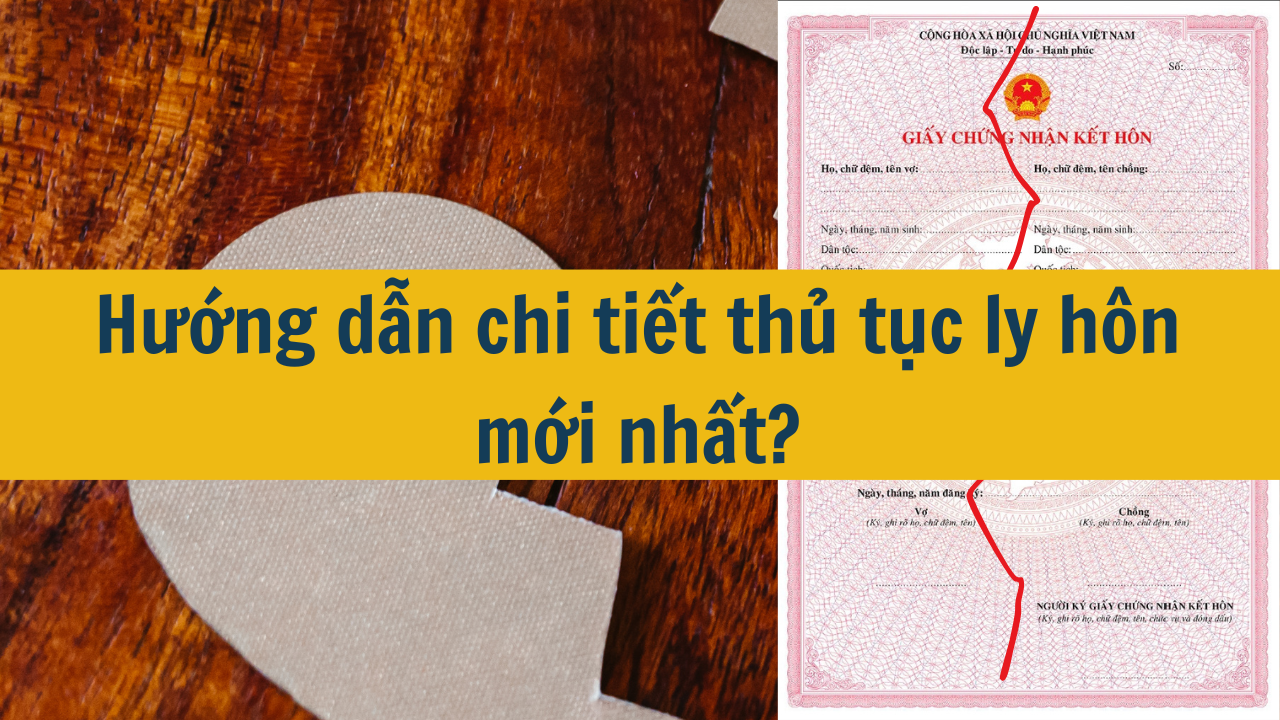
Hướng dẫn chi tiết thủ tục ly hôn mới nhất 2025?
Bài viết "Hướng dẫn chi tiết thủ tục ly hôn mới nhất 2025?" sẽ cung cấp cho bạn những thông tin cần thiết về quy trình ly hôn theo pháp luật Việt Nam, cập nhật mới nhất trong năm 2025. Bạn sẽ được hướng dẫn cụ thể về các bước cần thực hiện, từ việc chuẩn bị hồ sơ, nộp đơn, cho đến các thủ tục tại tòa án. Đồng thời, bài viết cũng giải đáp những thắc mắc liên quan đến thời gian xử lý, các giấy tờ cần thiết, và những vấn đề pháp lý có thể phát sinh trong quá trình ly hôn. Cùng tham khảo để nắm bắt chính xác và đầy đủ thông tin khi thực hiện thủ tục ly hôn. 17/01/2025Mức án phí ly hôn là bao nhiêu mới nhất 2025?
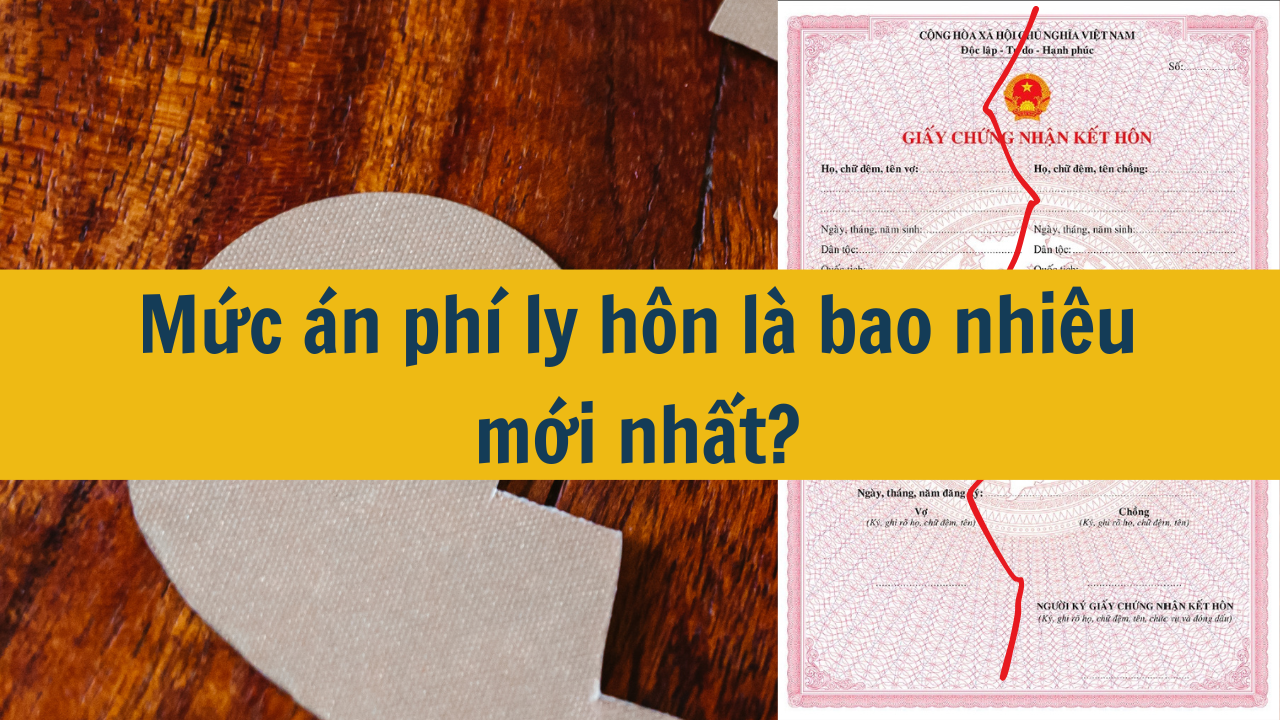
Mức án phí ly hôn là bao nhiêu mới nhất 2025?
Bài viết "Mức án phí ly hôn là bao nhiêu mới nhất 2025?" sẽ giúp bạn đọc hiểu rõ hơn về mức án phí cần phải trả khi thực hiện thủ tục ly hôn theo quy định của pháp luật Việt Nam. Cập nhật thông tin về mức phí, các yếu tố ảnh hưởng đến việc xác định án phí ly hôn, cũng như những thay đổi mới nhất trong năm 2025, bài viết này sẽ giúp bạn dễ dàng nắm bắt và chuẩn bị tốt nhất cho quy trình ly hôn. Hãy cùng tìm hiểu chi tiết để tránh các nhầm lẫn và biết rõ quyền lợi, nghĩa vụ của mình trong vấn đề này. 18/01/2025Ai được miễn án phí ly hôn mới nhất 2025?
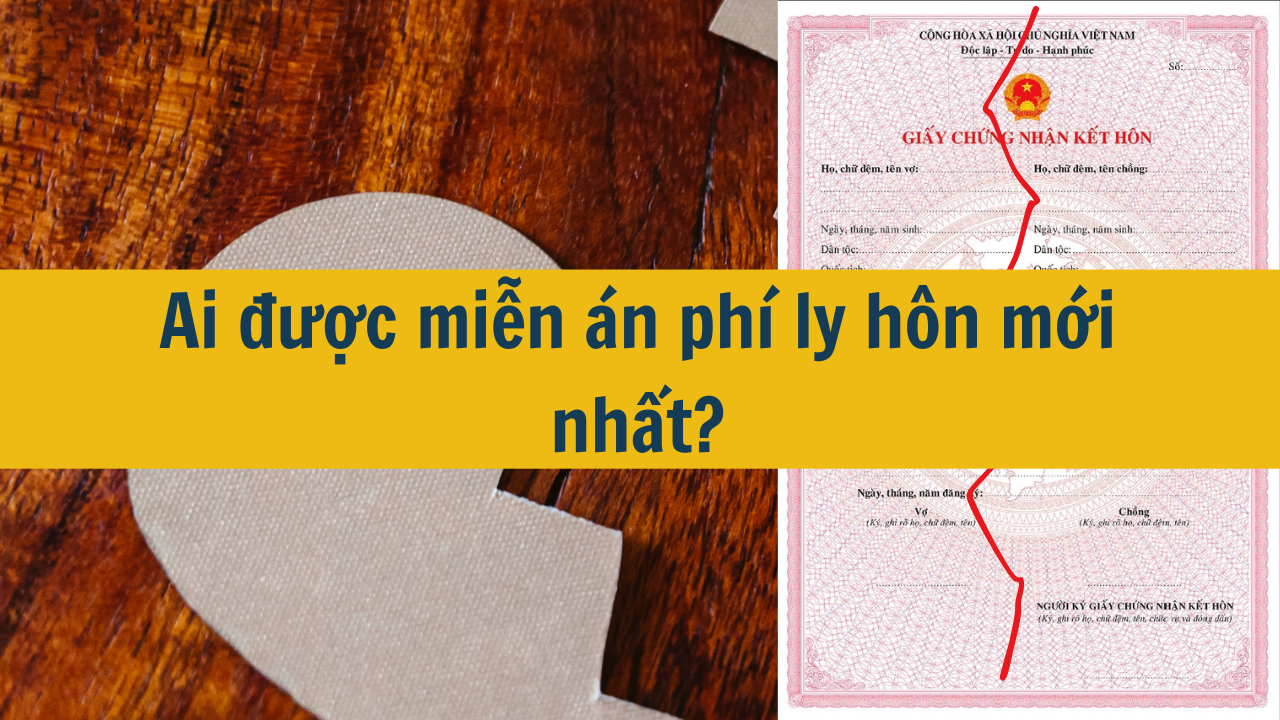
Ai được miễn án phí ly hôn mới nhất 2025?
Bài viết "Ai được miễn án phí ly hôn mới nhất 2025?" sẽ cung cấp thông tin chi tiết về những trường hợp được miễn án phí khi làm thủ tục ly hôn theo quy định mới nhất của pháp luật Việt Nam. Trong bài viết, chúng ta sẽ tìm hiểu những đối tượng, điều kiện và quy trình xét miễn án phí ly hôn, từ đó giúp người dân nắm rõ quyền lợi và nghĩa vụ của mình khi đối diện với các vụ ly hôn. Cùng với đó, các thay đổi trong luật pháp liên quan đến vấn đề này sẽ được làm rõ, giúp bạn đọc cập nhật thông tin chính xác và kịp thời. 18/01/2025Án phí ly hôn ai chịu mới nhất 2025?

Án phí ly hôn ai chịu mới nhất 2025?
Bài viết "Án phí ly hôn ai chịu mới nhất 2025?" sẽ giúp bạn giải đáp thắc mắc về vấn đề án phí trong thủ tục ly hôn theo quy định của pháp luật Việt Nam. Bạn sẽ tìm thấy thông tin chi tiết về việc ai sẽ là người chịu án phí trong các trường hợp ly hôn đơn phương và thuận tình ly hôn, cùng với những quy định mới nhất năm 2025. Bài viết không chỉ làm rõ các mức án phí phải đóng, mà còn cung cấp hướng dẫn về các tình huống đặc biệt, giúp bạn nắm rõ quyền lợi và nghĩa vụ tài chính trong quá trình ly hôn. 18/01/2025Giấy quyết định ly hôn có mấy bản? Dùng để làm gì mới nhất 2025?
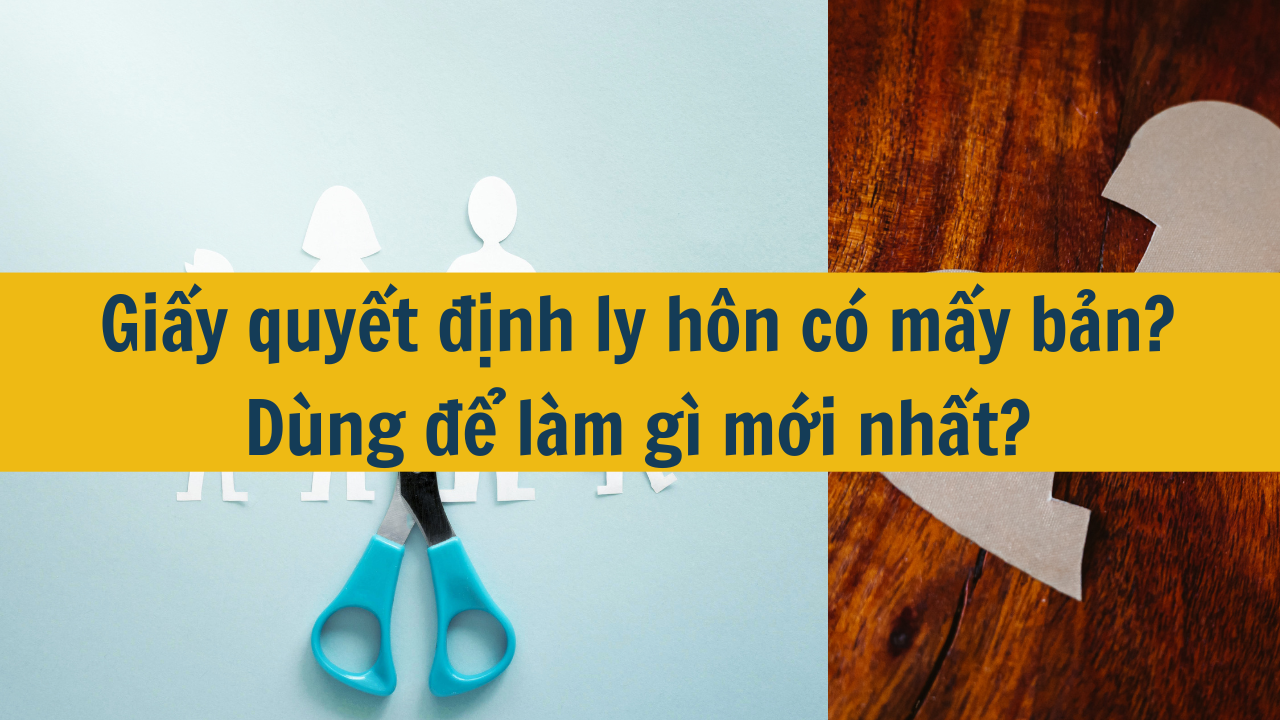
Giấy quyết định ly hôn có mấy bản? Dùng để làm gì mới nhất 2025?
Bài viết "Giấy quyết định ly hôn có mấy bản? Dùng để làm gì mới nhất 2025?" sẽ cung cấp cho bạn những thông tin chi tiết về số lượng bản sao của giấy quyết định ly hôn theo quy định của pháp luật hiện hành, cùng các mục đích sử dụng của từng bản sao trong các trường hợp khác nhau. Với những thay đổi và cập nhật mới nhất trong năm 2025, bài viết giúp bạn hiểu rõ hơn về cách thức xin cấp giấy quyết định ly hôn, các thủ tục liên quan và tầm quan trọng của các bản sao này trong các giao dịch pháp lý sau khi ly hôn. Đây là nguồn thông tin hữu ích, giúp bạn tránh được những vướng mắc không đáng có trong quá trình hoàn tất thủ tục ly hôn. 17/01/2025Ly hôn cần chuẩn bị giấy tờ gì mới nhất 2025?

Ly hôn cần chuẩn bị giấy tờ gì mới nhất 2025?
Ly hôn là một quá trình pháp lý đòi hỏi nhiều thủ tục và giấy tờ để đảm bảo quyền lợi cho cả hai bên. Việc chuẩn bị đầy đủ và chính xác các giấy tờ là yếu tố quan trọng để quá trình ly hôn diễn ra suôn sẻ và hợp pháp. Vậy, để thực hiện thủ tục ly hôn vào năm 2025, bạn cần chuẩn bị những giấy tờ gì? Bài viết này sẽ cung cấp cho bạn thông tin chi tiết về các loại giấy tờ cần thiết, từ đơn ly hôn cho đến các giấy tờ liên quan đến tài sản, con cái, giúp bạn dễ dàng hoàn tất thủ tục ly hôn một cách nhanh chóng và đúng quy định. 17/01/2025Có được bổ sung yêu cầu chia tài sản sau khi đã nộp đơn ly hôn không mới nhất 2025?
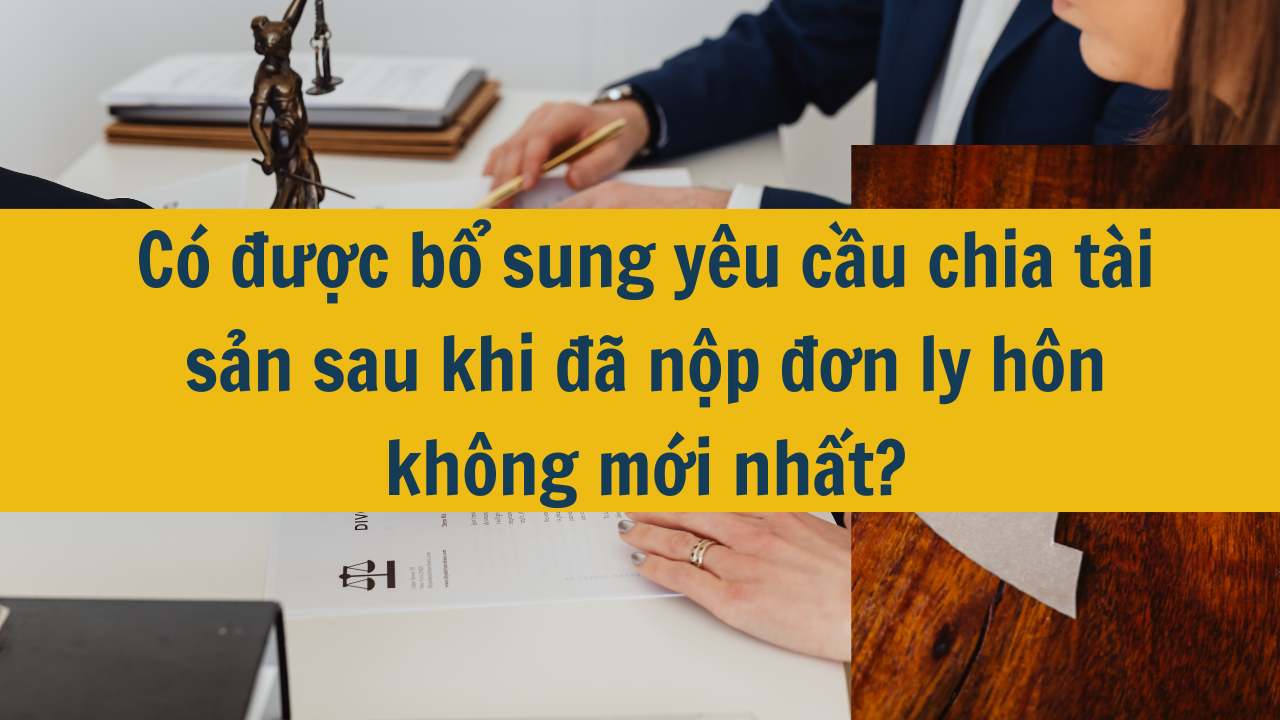
Có được bổ sung yêu cầu chia tài sản sau khi đã nộp đơn ly hôn không mới nhất 2025?
Khi thực hiện thủ tục ly hôn, vấn đề chia tài sản chung là một trong những vấn đề quan trọng mà nhiều cặp vợ chồng gặp phải. Tuy nhiên, trong quá trình này, không ít người băn khoăn liệu có thể bổ sung yêu cầu chia tài sản sau khi đã nộp đơn ly hôn hay không. Điều này đặc biệt quan trọng đối với những trường hợp ban đầu không đề cập đến tài sản hoặc khi phát sinh những vấn đề mới về tài sản sau khi đơn ly hôn đã được gửi đi. Bài viết dưới đây sẽ giải đáp câu hỏi này, cung cấp những thông tin mới nhất về quy định pháp lý liên quan đến việc bổ sung yêu cầu chia tài sản trong thủ tục ly hôn, đặc biệt là trong năm 2025. 17/01/2025Nộp đơn ly hôn cùng giấy tờ gì mới nhất 2025?
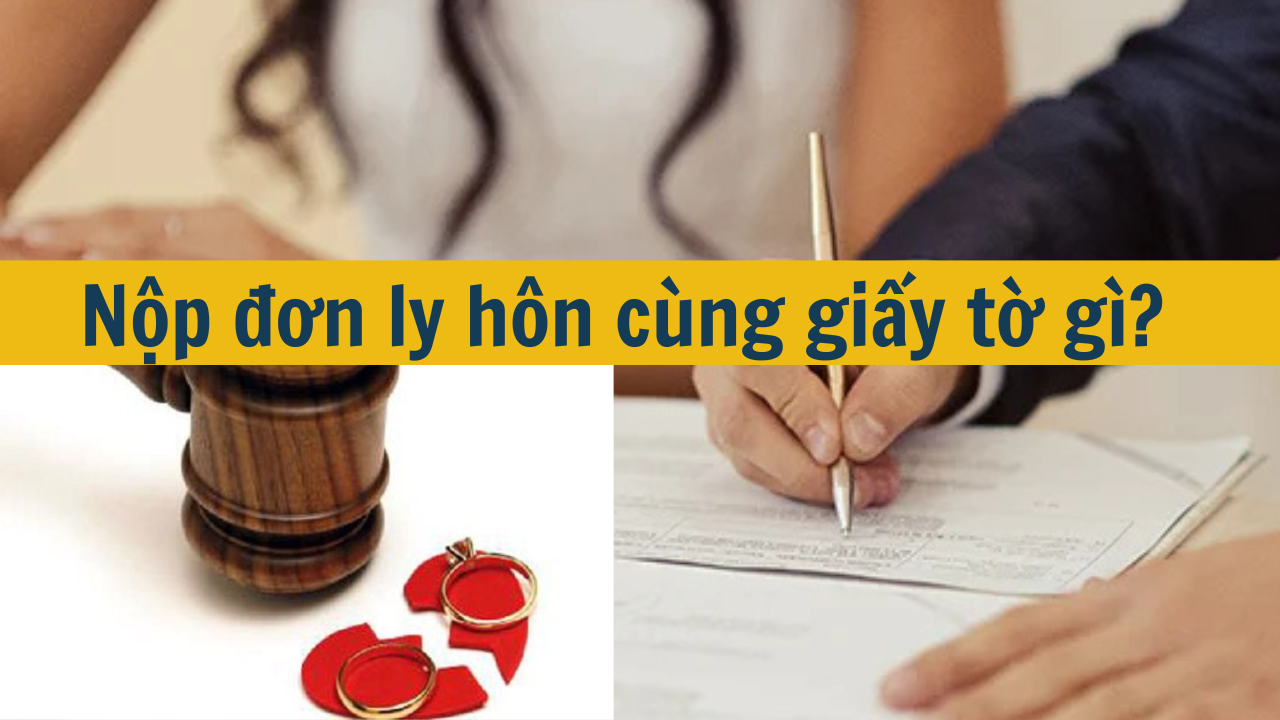
Nộp đơn ly hôn cùng giấy tờ gì mới nhất 2025?
Trong cuộc sống hôn nhân, không phải lúc nào mọi thứ cũng diễn ra suôn sẻ, và có những lúc, quyết định ly hôn trở thành giải pháp cuối cùng cho cả hai bên. Tuy nhiên, quá trình ly hôn không chỉ đơn thuần là quyết định dừng lại mà còn yêu cầu các thủ tục pháp lý nghiêm ngặt. Một trong những bước quan trọng đầu tiên là nộp đơn ly hôn cùng các giấy tờ cần thiết. Vậy, khi quyết định ly hôn, bạn cần chuẩn bị những giấy tờ gì? Hãy cùng tìm hiểu trong bài viết này để nắm rõ những bước cần thực hiện và chuẩn bị đầy đủ các hồ sơ cần thiết khi làm thủ tục ly hôn. 17/01/2025Lệ phí ly hôn thuận tình mất bao nhiêu mới nhất 2025?
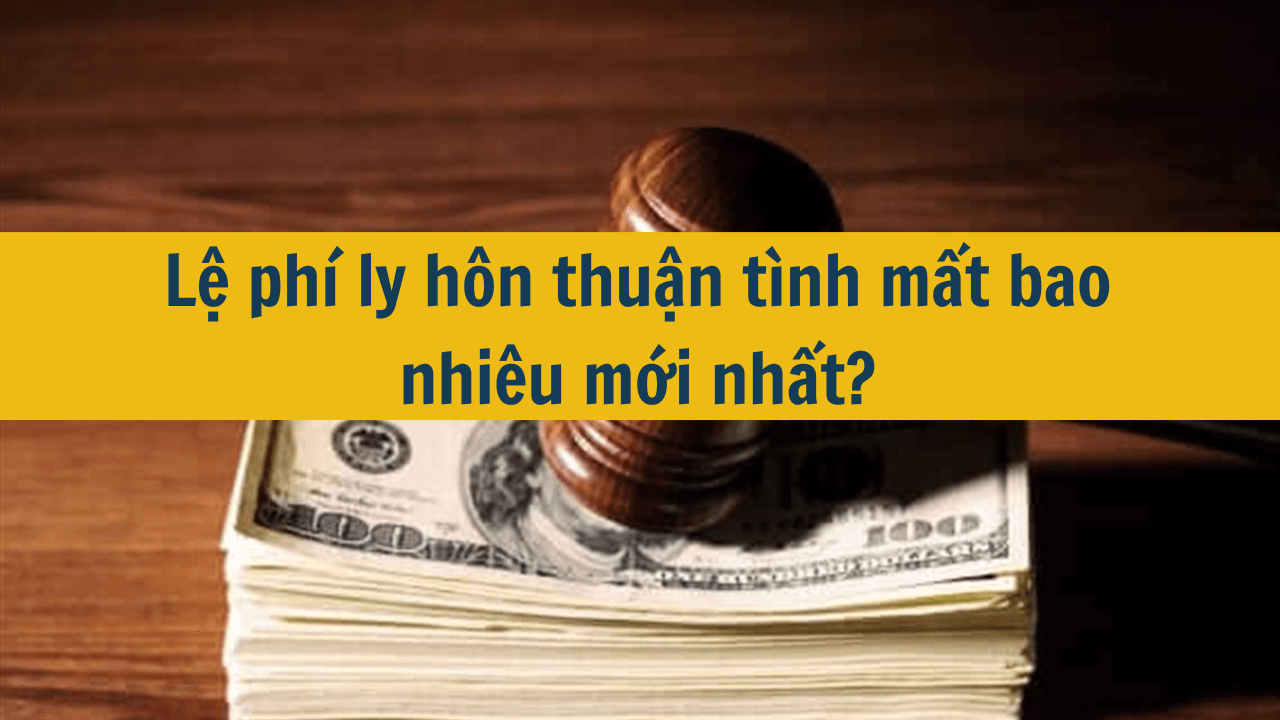
Lệ phí ly hôn thuận tình mất bao nhiêu mới nhất 2025?
Ly hôn thuận tình là thủ tục pháp lý mà cả hai vợ chồng cùng đồng ý chấm dứt hôn nhân và đã thống nhất về các vấn đề liên quan như quyền nuôi con, cấp dưỡng, và chia tài sản. Trong quá trình thực hiện thủ tục này, nhiều người quan tâm đến chi phí cần chi trả, đặc biệt là lệ phí nộp tại Tòa án. Năm 2025, mức lệ phí ly hôn thuận tình được quy định cụ thể trong các văn bản pháp luật, đảm bảo tính minh bạch và phù hợp với thực tế. Bài viết này sẽ cung cấp thông tin chi tiết về lệ phí ly hôn thuận tình theo quy định mới nhất cùng những lưu ý quan trọng trong quá trình thực hiện thủ tục. 28/12/2024Ly hôn thuận tình có cần phải ra Tòa án nữa không mới nhất 2025?
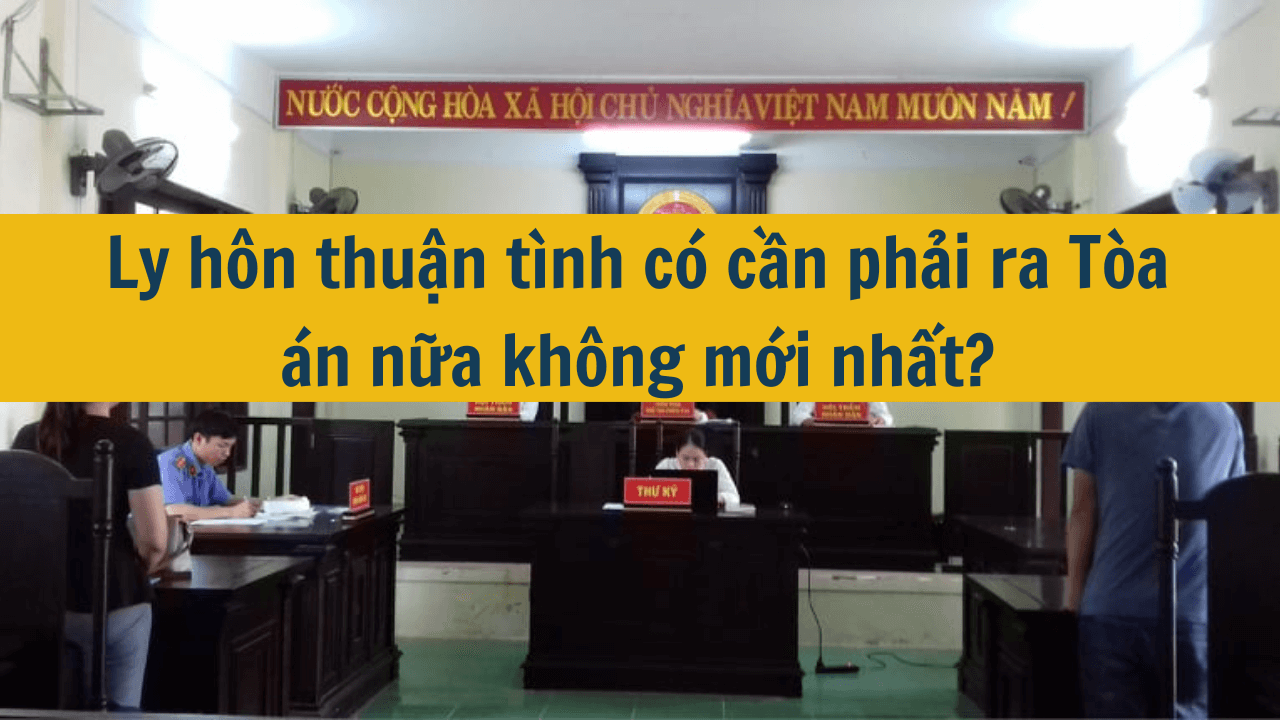

 Bộ luật tố tụng dân sự 2015 (Bản Word)
Bộ luật tố tụng dân sự 2015 (Bản Word)
 Bộ luật tố tụng dân sự 2015 (Bản Pdf)
Bộ luật tố tụng dân sự 2015 (Bản Pdf)